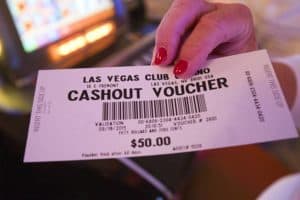With the days of coin-based slots long receded, these tickets are how slot and video poker players collect their winnings. Machine-dispensed tickets must be taken to either a kiosk — the industry name is a ticket-in, ticket-out machine — or the casino’s cage and exchanged for cash.
According to Nevada gaming regulations, the tickets expire at a date the casino sets or 180 days, whichever is sooner.
In recent years, for whatever reason, gamblers actually let quite a bit more than $35 million worth of tickets expire. According to Nevada law, the state government only gets a portion of what players abandon.
In 2011, Assemblyman William Horne, D-Las Vegas, spearheaded Assembly Bill 219, which mandates that 75 percent of the revenue from lost vouchers be sent to the state’s general fund and 25 percent stay with the casinos.
The Nevada Gaming Control Board is responsible for gathering that money and sending it off to the state’s general fund. Each quarter, the casinos report the total dollar amount of unclaimed vouchers to the board and then pay the board 75 percent of that amount.
And Nevada has done well over the five years since the law was enacted, averaging nearly $8 million annually in expired slot voucher collections in the past four years of complete reporting.
In the fiscal 2016 year alone, there was almost $12 million worth of abandoned tickets. From that, the state received $8.78 million. The rest went back to the casinos.
Not surprisingly, the Las Vegas Strip is where most of the money from these abandoned tickets was won. Also in the 2016 fiscal year, just more than $7 million worth of slot and video tickets was left unclaimed on the Strip.
Downtown saw the next largest amount, with just less than $1 million, then Washoe County with just more than $900,000, the rest of Clark County (not including the Strip, downtown, North Las Vegas and the Boulder Strip) with $651,393, the Boulder Strip, with just more than $500,000, South Tahoe, with $223,275, and North Las Vegas with $193,640.
The casinos report the total of the funds left unclaimed and they don’t break out the values of individual abandoned tickets. They also won’t release any statistics, so there’s no way to know the average amount of the tickets that are abandoned.
But it’s safe to say that many tickets are for such small amounts that players feel it’s not worth the time nor effort to redeem them.
Other times, players may lose or damage the tickets and think their money is gone forever. However, that may not be true. In many cases, casinos will work with their guests to help them retrieve lost funds.
The important thing to remember about the tickets is they are anonymous, and at first glance, there is no way to tie a specific ticket to a specific player.
However, almost all major casinos have loyalty cards or rewards programs that can be used to connect players with their lost tickets.
“If the guest has an Mlife loyalty card, then we can trace it,” said Mary Hynes, director of public affairs at MGM Resorts International. “Which is good reason to have such a card. If they don’t have a card, it becomes more complicated.”
It’s complicated but not impossible. Depending on the amount of the ticket, casinos are willing to do some research. They’ll check records and sometimes even review video footage.
The situation is similar if the ticket is damaged. Station, Boyd, MGM and Caesars all said if a ticket is legible, they’ll honor it. If it’s not, they can use the loyalty cards or other records to figure out the correct amount.
In some cases, even if the player completely forgets they lost a ticket, the casinos will try to return the money.
“If we find a voucher, we will try to reconnect with its rightful owner — typically if it’s at least $10 or more,” Hynes said. “Sometimes people leave them in the machine, and we find them and we do try to send it to them. If they are a loyalty card holder, we can find that person more easily. If they are still staying with us, we’ll get it to their rooms. If they left town and we know who it is, we’ll mail it to them.”
But what should other players do if they find a winning ticket someone else left behind in a machine or elsewhere in the casino?
Of course, they could turn it in for cash. The tickets are essentially money, and there’s no immediate way that cashiers can tell the difference between a winner and somebody who just found the ticket.
“If a ticket is lost, it is the same as if a $20 bill was lost,” Caesars Entertainment spokeswoman Chelsea Ryder said.
But the Gaming Control Board looks at the issue in a very basic way: Even if a casino ticket is lost, it belongs to the person who won it — not the person who happened to find it.
“In a perfect world, someone who found chips or cash or tickets would turn them into security who may have a policy in place where if no one claims the property in XX days, you may claim it,” a control board spokesperson said.
“The District Attorney seems to agree as far as going forward with criminal cases we submit based on the ‘theft’ of slot vouchers. The law that governs it is NRS 205.0832, and the actual value of the voucher or item would determine the penalty, i.e., whether it’s considered a misdemeanor or felony.
“There may be other circumstances where we might be able to charge the actual gaming crime of Fraudulent Acts, NRS 465.070,” he said. “Basically, taking something from a gambling game without having made a wager. This oftentimes applies to lost or stolen race and sports tickets. Keep in mind, too, that employees could be charged as well if they found a voucher, cashed it or did not turn it in.”

 Gamblers left more than $35 million on casino floors in the past five years, money the state of Nevada was happy to come along and pick up. The cash came in the form of slot and video machine tickets that players either lost, forgot about or simply didn’t bother to turn in.
Gamblers left more than $35 million on casino floors in the past five years, money the state of Nevada was happy to come along and pick up. The cash came in the form of slot and video machine tickets that players either lost, forgot about or simply didn’t bother to turn in.